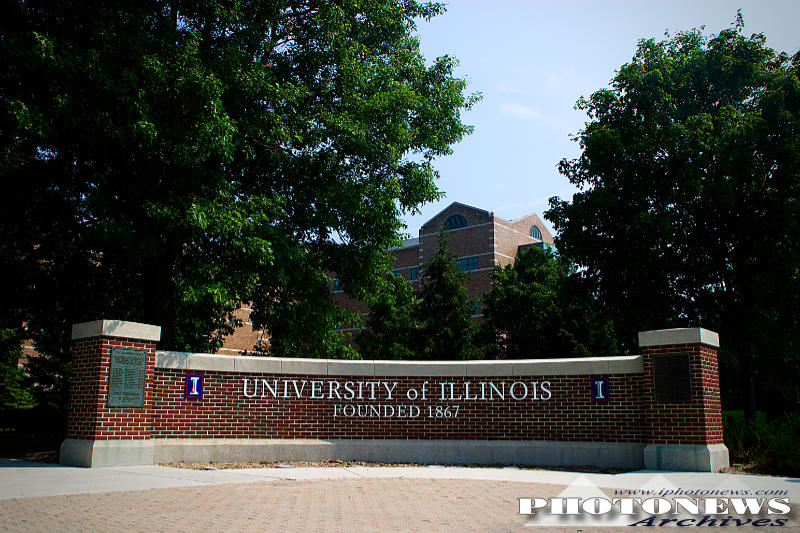
Thousands of students visit Quad Day on the University of Illinois campus in 2003. The university hosts hundreds of student-lead recreational, social and political organizations each semester.
Photo: PhotoNews Media Archives
Students have long picked schools based on their academic reputations and social life.
By Jon Marcus
When Angel Amankwaah traveled from Denver to North Carolina Central University for incoming student orientation this summer, she decided she had made the right choice.
She had fun learning the chants that fans perform at football games. But she also saw that “there are students who look like me, and professors who look like me” at the historically Black university, said Amankwaah, 18, who is Black. “I knew that I was in a safe space.”
This has now become an important consideration for college-bound students from all backgrounds and beliefs.
Students have long picked schools based on their academic reputations and social life. But with campuses in the crosshairs of the culture wars, many students are now also taking stock of attacks on diversity, course content, and speech and speakers from both ends of the political spectrum. They’re monitoring hate crimes, anti-LGBTQ legislation, state abortion laws and whether students like them — Black, rural, military veterans, LGBTQ or from other backgrounds — are represented and supported on campus.
“There’s no question that what’s happening at the state level is directly affecting these students,” said Alyse Levine, founder and CEO of Premium Prep, a private college admissions consulting firm in Chapel Hill, North Carolina. When they look at colleges in various states now, she said, “There are students who are asking, ‘Am I really wanted here?’ ”
For some students on both sides of the political divide, the answer is no. In the chaotic new world of American colleges and universities, many say they feel unwelcome at certain schools, while others are prepared to shut down speakers and report faculty with whose opinions they disagree.
It’s too early to know how much this trend will affect where and whether prospective students end up going to college, since publicly available enrollment data lags real time. But there are early clues that it’s having a significant impact.
One in four prospective students has already
ruled out a college or university for consideration because of the political climate in its state, according to a survey by the higher education consulting firm Art & Science Group.

Students from a campus club demonstrate Capoeira, an Afro-Brazilian martial art and game that includes elements of dance, acrobatics, music and spirituality at Quad Day in 2003.
Photo: PhotoNews Media Archives
Among students who describe themselves as liberal, the most common reason to rule out colleges and universities in a particular state, that survey found, is because it’s “too Republican” or has what they consider lax gun regulations, anti-LGBTQ legislation, restrictive abortion laws and a lack of concern about racism. Students who describe themselves as conservative are rejecting states they believe to be “too Democrat” and that have liberal abortion and gay-rights laws.
One in eight high school students in Florida say they won’t go to a public university in their own state because of its education policies.
With so much attention focused on these issues,
The Hechinger Report has created a first-of-its-kind College Welcome Guide showing state laws and institutional policies that affect college and university students, from bans on diversity, equity and inclusion initiatives and “critical race theory” to rules about whether student IDs are accepted as proof of residency for voting purposes.
The interactive guide also lists, for every four-year institution in the country, such things as racial and gender diversity among students and faculty, the number of student veterans enrolled, free-speech rankings, the incidence of on-campus race-motivated hate crimes and if the university or college serves many students from rural places.
Sixty percent of prospective students of all backgrounds say new state restrictions on abortion would at least somewhat influence
where they choose to go to college, a separate poll by Gallup and the Lumina Foundation found. Of these, eight in 10 say they would prefer to go to a state with greater access to reproductive health services. (Lumina is among the funders of The Hechinger Report.)
“We have many young women who will not look at certain states,” said Levine. One of her own clients backed out of going to a university in St. Louis after Missouri banned almost all abortions in the wake of the Supreme Court’s Dobbs decision, she said.
Institutions in Alabama, Florida, Louisiana and Texas are the most likely to be knocked off the lists of liberal students, according to the Art & Science Group survey, while conservative students avoid California and New York.
One in eight high school students in Florida say they
won’t go to a public university in their own state because of its education policies, a separate poll, by the college ranking and information website Intelligent.com, found.
With
494 anti-LGBTQ laws proposed or adopted this year, according to the American Civil Liberties Union, prospective students who are LGBTQ and have experienced significant harassment because of it are nearly
twice as likely to say they don’t plan to go to college at all than students who experienced lower levels of harassment, according to a survey by GLSEN, formerly the Gay, Lesbian and Straight Education Network.
“You are attacking kids who are already vulnerable,” said Javier Gomez, an LGBTQ student in his first year at Miami Dade College. “And it’s not just queer students. So many young people are fed up.”
It’s not yet evident whether the new laws are affecting where LGBTQ young people are choosing to go to college, said Casey Pick, director of law and policy at The Trevor Project, which supports LGBTQ young people in crisis. But LGBTQ adults are moving away from states passing anti-LGBTQ laws, she said. And “if adult employees are taking this into account when they decide where they want to live, you can bet that college students are making the same decisions.”

Students protest Israel's Independence Day on the Quad in May 2006. Universities have always been an environment for political and cultural awareness and ideas. Today, campuses are becoming more hostile to diversity in race, religion, and sexual orientation.
Meanwhile, in an era of pushback against diversity, equity and inclusion policies in many states, and against affirmative action nationwide, Amankwaah is one of a growing number of Black students choosing what they see as the relative security of an HBCU. Enrollment at HBCUs
increased by around 3 percent in 2021, the last year for which the figure is available, while the number of students at other universities and colleges
fell.
College students of all races and political persuasions report feeling uncomfortable on campuses that have become political battlegrounds.
“The real attack here is on the feeling of belonging,” said Jeremy Young, who directs the Freedom to Learn program at PEN America, which
tracks laws that restrict college and university diversity efforts and teaching about race. “What it really does is hoist a flag to say to the most marginalized students, ‘We don’t want you here.’ ”
More than 40 percent of university and college administrators say the Supreme Court ruling curbing the use of affirmative action in admissions
will affect diversity on their campuses, a Princeton Review poll found as the school year was beginning.
College students of all races and political persuasions report feeling uncomfortable on campuses that have become political battlegrounds. Those on the left are bristling at new laws blocking programs in diversity, equity and inclusion and the teaching of certain perspectives about race; on the right, at conservative speakers being shouted down or canceled, unpopular comments being called out in class and what they see as an embrace of values different from what they learned at home.
One Michigan father said he supported his son’s decision to skip college. Other parents, he said, are discouraging their kids from going, citing “binge-drinking, hookup culture, secular teachings, a lopsided leftist faculty mixed with anti-Americanism, anti-capitalism, anti-free speech and a diversity, equity and inclusion emphasis” that he said is at odds with a focus on merit. The father asked that his name not be used so that his comments didn’t reflect on his daughter, who attends a public university.
More than one in 10 students at four-year universities now say they
feel as if they downright don’t belong on their campus, and another two in 10 neither agree nor strongly agree that they belong, another Lumina and Gallup survey found. It found that those who answer in these ways are more likely to frequently experience stress and more likely to drop out. One in four Hispanic students report frequently or occasionally
feeling unsafe or experiencing disrespect, discrimination or harassment.
Military veterans who use their G.I. Bill benefits to return to school say one of their most significant barriers is
a feeling that they won’t be welcome, a survey by the D’Aniello Institute for Veterans and Military Families at Syracuse University found. Nearly two-thirds say that faculty and administrators
don’t understand the challenges they face, and 70 percent say the same thing about their non-veteran classmates.
Colleges should be “safe and affirming spaces,” said Pick, of the Trevor Project — not places of isolation and alienation.
An anthropology lecturer at the University of Chicago who taught an undergraduate course called “The Problem of Whiteness” said she was deluged with hateful messages when a conservative student posted her photo and email address on social media.
Yet a significant number of students say
they don’t feel comfortable sharing their views in class, according to another survey, conducted by College Pulse for the right-leaning Sheila and Robert Challey Institute for Global Innovation and Growth at North Dakota State University. Of those, 72 percent say they worry their opinions would be considered unacceptable by classmates and 45 percent, by their professors. Conservative students are less likely than their liberal classmates to believe that all points of view are welcome and less willing to share theirs.
“Is that really an intellectually diverse environment?” asked Sean Stevens, director of polling and analytics at the Foundation for Individual Rights and Expression, or FIRE, which
has launched a campus free-speech ranking based on students’ perceptions of comfort expressing ideas, tolerance for speakers and other measures.
“Anecdotally and from personal experience, there’s certainly a pocket of students who are weighing these factors in terms of where to go to college,” Stevens said.
Eighty-one percent of liberal students and 53 percent of conservative ones say they support
reporting faculty who make comments that they find offensive, the same survey found. It used sample comments such as, “There is no evidence of anti-Black bias in police shootings,” “Requiring vaccination for COVID is an assault on individual freedom” and “Biological sex is a scientific fact.”
A professor at Texas A&M University was put under investigation when a student accused her of criticizing the state’s lieutenant governor during a lecture, though she was ultimately exonerated. An anthropology lecturer at the University of Chicago who taught an undergraduate course called “The Problem of Whiteness” said she was deluged with hateful messages when a conservative student posted her photo and email address on social media.
More than half of all freshmen say that colleges have the right
to ban extreme speakers, according to an annual survey by an institute at UCLA; the College Pulse poll says that sentiment is held by twice the proportion of liberal students as conservative ones.
An appearance by a conservative legal scholar who spoke at Washington College in Maryland last month was disrupted by students because of his positions about LGBTQ issues and abortion. The subject: free speech on campus.
Many conservative critics of colleges and universities say faculty are indoctrinating students with liberal opinions.
A group of Stanford students in March disrupted an on-campus speech by a federal judge whose judicial record they said was anti-LGBTQ. When he asked for an administrator to intervene, an associate dean for diversity, equity and inclusion
confronted him and asked: “Is it worth the pain that this causes and the division that this causes?” The associate dean was put on leave and later resigned.
“Today it is a sad fact that the greatest threat to free speech comes from within the academy,” pronounced the right-leaning American Council of Trustees and Alumni, which is pushing colleges to sign on to its Campus Freedom Initiative that encourages
teaching students about free expression during freshman orientation and disciplining people who disrupt speakers or events, among other measures.

The University of Illinois welcomes students from all backgrounds who wish to pursue a higher education.
Photo: PhotoNews Media Archives
“I have to imagine that universities that have a bad track record on freedom of expression or academic freedom, that it will affect their reputations,” said Steven Maguire, the organization’s campus freedom fellow. “I do hear people saying things like, ‘I’m worried about what kind of a college or university I can send my kids to and whether they’ll be free to be themselves and to express themselves.’ ”
Some colleges are now actively recruiting students on the basis of these kinds of concerns. Colorado College in September created a program to ease the process for students
who want to transfer away from institutions in states that have banned diversity, equity and inclusion initiatives; Hampshire College in Massachusetts
has offered admission to any student from New College in Florida, subject of what critics have described as a conservative takeover. Thirty-five have so far accepted the invitation.
Though many conservative critics of colleges and universities say faculty are indoctrinating students with liberal opinions, incoming freshmen
tend to hold left-leaning views before they ever set foot in a classroom, according to that UCLA survey.
Fewer than one in five consider themselves conservative. Three-quarters say abortion should be legal and favor stricter gun control laws, 68 percent say wealthy people should pay more taxes than they do now and 86 percent that climate change should be a federal priority and that there should be a clear path to citizenship for undocumented immigrants.
Prospective students say they are watching as new laws are passed and controversies erupt on campuses, and actively looking into not just the quality of food and available majors at the colleges they might attend, but state politics.
“Once I decided I was going to North Carolina Central, I looked up whether North Carolina was a red state or a blue state,” Amankwaah said. (North Carolina has a Democrat as governor but Republicans control both chambers of the legislature and hold a veto-proof supermajority in the state Senate.)
Florida’s anti-LGBTQ laws prompted Javier Gomez to leave his native state and move to New York to go to fashion school. But then he came back, transferring to Miami Dade.
“People ask me, ‘Why the hell are you back in Florida?’ ” said Gomez. “The reason I came back was that there was this innate calling in me that you have to stick around and fight for the queer and trans kids here. It’s overwhelming at times. It can be very mentally depleting. But I wanted to stay and continue the fight and build community against hatred.”
Jon Marcus wrote this article for The Hechinger Report. This article is provided by the Illinois News Connection.










 Best Lawyers, which has been tracking trends and innovations in the legal industry for more than four decades, serves as a trusted resource for identifying what it takes to be a preeminent law firm in the United States. Their recently released 14th annual rankings of Best Law Firms, found at bestlawfirms.com, provides keen insight, not only into the most successful law firms, but also the key factors to keep an eye out for when going through the reliably trying task of retaining counsel.
Here is some of Best Lawyers’ advice:
1. Does the firm use the latest technology?
Right now, even the legal profession is abuzz about generative Artificial Intelligence (gen AI) tools. With its ability to parse information more quickly, gen AI offers the immediate potential to automate routine tasks such as research; summarizing long, complex content; and writing first drafts of simple documents such as NDAs. All of which can save both time and money.
And smart firms are closely watching regulations and any risks that this new technology may bring, all while using it for the benefit of the firm and its clients.
2. What do other legal experts think about the way they do business?
There are better options available than just word of mouth when choosing
Best Lawyers, which has been tracking trends and innovations in the legal industry for more than four decades, serves as a trusted resource for identifying what it takes to be a preeminent law firm in the United States. Their recently released 14th annual rankings of Best Law Firms, found at bestlawfirms.com, provides keen insight, not only into the most successful law firms, but also the key factors to keep an eye out for when going through the reliably trying task of retaining counsel.
Here is some of Best Lawyers’ advice:
1. Does the firm use the latest technology?
Right now, even the legal profession is abuzz about generative Artificial Intelligence (gen AI) tools. With its ability to parse information more quickly, gen AI offers the immediate potential to automate routine tasks such as research; summarizing long, complex content; and writing first drafts of simple documents such as NDAs. All of which can save both time and money.
And smart firms are closely watching regulations and any risks that this new technology may bring, all while using it for the benefit of the firm and its clients.
2. What do other legal experts think about the way they do business?
There are better options available than just word of mouth when choosing 











